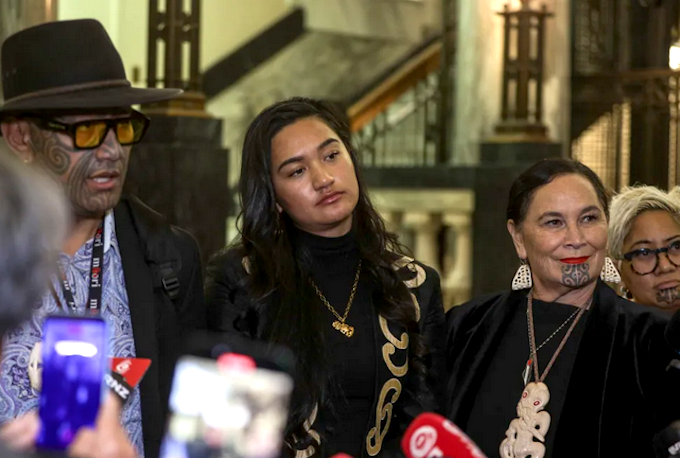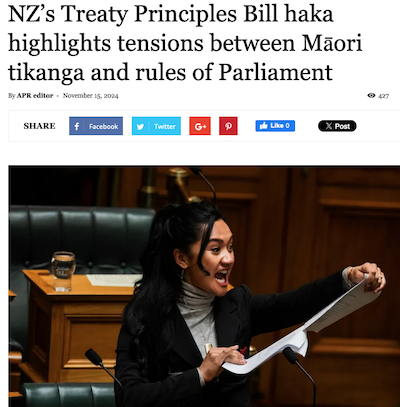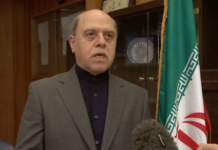
Aotearoa New Zealand’s Parliament has confirmed the unprecedented punishments proposed for opposition indigenous Te Pāti Māori MPs who performed a haka in protest against the Treaty Principles Bill.
Te Pāti Māori co-leaders Debbie Ngarewa-Packer and Rawiri Waititi will be suspended for 21 days, and MP Hana-Rawhiti Maipi-Clarke suspended for seven days, taking effect immediately.
Opposition parties tried to reject the recommendation, but did not have the numbers to vote it down.
- READ MORE: NZ’s Treaty Principles Bill haka highlights tensions between Māori tikanga and rules of Parliament
- Other haka reports
Te Pati Maori MPs speak after being suspended. Video: RNZ/Mark Papalii
The heated debate to consider the proposed punishment came to an end just before Parliament was due to rise.
Waititi moved to close the debate and no party disagreed, ending the possibility of it carrying on in the next sitting week.
Leader of the House Chris Bishop — the only National MP who spoke — kicked off the debate earlier in the afternoon saying it was “regrettable” some MPs did not vote on the Budget two weeks ago.
Bishop had called a vote ahead of Budget Day to suspend the privileges report debate to ensure the Te Pāti Māori MPs could take part in the Budget, but not all of them turned up.
Robust, rowdy debate
The debate was robust and rowdy with both the deputy speaker Barbara Kuriger and temporary speaker Tangi Utikare repeatedly having to ask MPs to quieten down.

Tākuta Ferris spoke first for Te Pāti Māori, saying the haka was a “signal of humanity” and a “raw human connection”.
He said Māori had faced acts of violence for too long and would not be silenced by “ignorance or bigotry”.
“Is this really us in 2025, Aotearoa New Zealand?” he asked the House.
“Everyone can see the racism.”
He said the Privileges Committee’s recommendations were not without precedent, noting the fact Labour MP Peeni Henare, who also participated in the haka, did not face suspension.

Henare attended the committee and apologised, which contributed to his lesser sanction.
‘Finger gun’ gesture
MP Parmjeet Parmar — a member of the Committee — was first to speak on behalf of ACT, and referenced the hand gesture — or “finger gun” — that Te Pāti Māori co-leader Debbie Ngarewa-Packer made in the direction of ACT MPs during the haka.
Parmar told the House debate could be used to disagree on ideas and issues, and there was not a place for intimidating physical gestures.
Greens co-leader Marama Davidson said New Zealand’s Parliament could lead the world in terms of involving the indigenous people.
She said the Green Party strongly rejected the committee’s recommendations and proposed their amendment of removing suspensions, and asked the Te Pāti Māori MPs be censured instead.
Davidson said the House had evolved in the past — such as the inclusion of sign language and breast-feeding in the House.
She said the Greens were challenging the rules, and did not need an apology from Te Pāti Māori.

NZ First leader Winston Peters said Te Pāti Māori and the Green Party speeches so far showed “no sincerity, saying countless haka had taken place in Parliament but only after first consulting the Speaker.
“They told the media they were going to do it, but they didn’t tell the Speaker did they?
‘Bunch of extremists’
“The Māori party are a bunch of extremists,” Peters said, “New Zealand has had enough of them”.
Peters was made to apologise after taking aim at Waititi, calling him “the one in the cowboy hat” with “scribbles on his face” [in reference to his traditional indigenous moko — tatoo]. He continued afterward, describing Waititi as possessing “anti-Western values”.
Labour’s Willie Jackson congratulated Te Pāti Māori for the “greatest exhibition of our culture in the House in my lifetime”.
Jackson said the Treaty bill was a great threat, and was met by a great haka performance. He was glad the ACT Party was intimidated, saying that was the whole point of doing the haka.
He also called for a bit of compromise from Te Pāti Māori — encouraging them to say sorry — but reiterated Labour’s view the sanctions were out of proportion with past indiscretions in the House.

Greens co-leader Chlöe Swarbrick said the debate “would be a joke if it wasn’t so serious”.
“Get an absolute grip,” she said to the House, arguing the prime minister “is personally responsible” if the House proceeds with the committee’s proposed sanctions.
Eye of the beholder
She accused National’s James Meager of “pointing a finger gun” at her — the same gesture coalition MPs had criticised Ngarewa-Packer for during her haka. The Speaker accepted he had not intended to; Swarbrick said it was an example where the interpretation could be in the eye of the beholder.
She said if the government could “pick a punishment out of thin air” that was “not a democracy”, putting New Zealand in very dangerous territory.
An emotional Maipi-Clarke said she had been silent on the issue for a long time, the party’s voices in haka having sent shockwaves around the world. She questioned whether that was why the MPs were being punished.
“Since when did being proud of your culture make you racist?”
“We will never be silenced, and we will never be lost,” she said, calling the Treaty Principles bill a “dishonourable vote”.
She had apologised to the Speaker and accepted the consequence laid down on the day, but refused to apologise. She listed other incidents in Parliament that resulted in no punishment.
NZ Parliament TV: Te Pāti Māori Privileges committee debate. Video: RNZ
Maipi-Clarke called for the Treaty of Waitangi to be recognised in the Constitution Act, and for MPs to be required to honour it by law.
‘Clear pathway forward’
“The pathway forward has never been so clear,” she said.
ACT’s Nicole McKee said there were excuses being made for “bad behaviour”, that the House was for making laws and having discussions, and “this is not about the haka, this is about process”.
She told the House she had heard no good ideas from the Te Pāti Māori, who she said resorted to intimidation when they did not get their way, but the MPs needed to “grow up” and learn to debate issues. She hoped 21 days would give them plenty of time to think about their behaviour.
Labour MP and former Speaker Adrian Rurawhe started by saying there were “no winners in this debate”, and it was clear to him it was the government, not the Parliament, handing out the punishments.
He said the proposed sanctions set a precedent for future penalties, and governments might use it as a way to punish opposition, imploring National to think twice.
He also said an apology from Te Pāti Māori would “go a long way”, saying they had a “huge opportunity” to have a legacy in the House, but it was their choice — and while many would agree with the party there were rules and “you can’t have it both ways”.

Te Pāti Māori co-leader Rawiri Waititi said there had been many instances of misinterpretations of the haka in the House and said it was unclear why they were being punished, “is it about the haka . . . is about the gun gestures?”
“Not one committee member has explained to us where 21 days came from,” he said.
Hat and ‘scribbles’ response
Waititi took aim at Peters over his comments targeting his hat and “scribbles” on his face.
He said the haka was an elevation of indigenous voice and the proposed punishment was a “warning shot from the colonial state that cannot stomach” defiance.
Waititi said that throughout history when Māori did not play ball, the “coloniser government” reached for extreme sanctions, ending with a plea to voters: “Make this a one-term government, enrol, vote”.
He brought out a noose to represent Māori wrongfully put to death in the past, saying “interpretation is a feeling, it is not a fact . . . you’ve traded a noose for legislation”.
This article is republished under a community partnership agreement with RNZ.












































